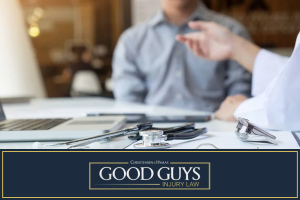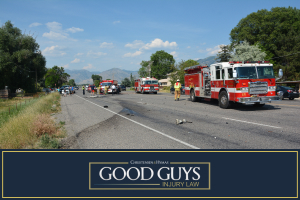
After a car accident, one of the first worries you might have is about your medical bills. These bills can pile up quickly, leaving you stressed about how to pay them. Knowing who will cover these costs is crucial. Good Guys Injury Law is here to help you understand your options.
While the health and car insurance companies could cover some of your medical treatment costs, you need to know the details. Review your own health insurance and car insurance policy to see what is covered and what is not. Then, remember that the other party’s auto accident insurance company could also cover some expenses. When it comes to medical payment coverage, a personal injury case could be necessary. This extra settlement can make a major difference if your primary health insurance benefits are inadequate.
Learn more below, and contact us to schedule a free case consultation.
Table of Contents
Types of Medical Bills After a Car Accident
A. Emergency Room (ER) Services
ER services are often the first car accident medical bills you’ll face after a crash. These services might be expensive, particularly if you need immediate, life-saving treatment. ER bills can include costs for doctors, nurses, medical tests, and emergency procedures.
B. Ambulance Fees
If you need an ambulance to get to the hospital, you’ll have a bill for this service. Ambulance fees can vary widely based on the distance traveled and the care provided during the ride. Some health insurance companies cover ambulance fees, but many do not.
C. Hospitalization Costs
The costs can add up quickly if you need to go to the hospital. Hospitalization expenses include room charges, meals, nursing care, and any necessary procedures or surgeries. These bills are often the largest expenses you’ll face after an accident.
D. Physician and Specialist Fees
Doctors and specialists who treat you will charge for their services. This can include the ER medical provider, any surgeons, and specialists like orthopedists or neurologists. Each professional will be billed separately for their services.
E. Diagnostic Tests
Diagnostic imaging such as X-rays, MRIs, and CT scans help diagnose your injuries. These tests can be costly but are often necessary to understand the extent of your injuries. Your insurance may cover these costs, but you might still be responsible for copays or deductibles.
F. Prescription Medications
After a car accident, you might need prescription medications for pain, inflammation, or other issues. These medications can be expensive, especially if you need them for an extended period. Check if your insurance covers these costs or if you need to pay out of pocket.
G. Physical Therapy
Physical therapy is common after car accidents, especially for injuries like whiplash or back problems. Your health insurance might cover some of these costs, but you’ll likely have some out-of-pocket expenses.
H. Medical Equipment and Supplies
You might need medical equipment like crutches, braces, or wheelchairs. These supplies are essential for your recovery but can be expensive. Check with your insurance to see what they cover and what you’ll need to pay for.
I. Home Healthcare Services
If your injuries are severe, you might need home healthcare services. These services can include nursing care, physical therapy, or assistance with daily activities. Home healthcare can be costly, so knowing if your insurance covers these services is essential.
J. Follow-up Appointments
After your initial treatment, you’ll likely have follow-up appointments with your doctors. These appointments are essential for your recovery but can be a recurring expense. Make sure to budget for these ongoing medical costs.
K. Mental Health Services
Car accidents can be traumatic, and you might need mental health services like counseling or therapy. Mental health is an integral part of your recovery. Check if your insurance covers these services or if you’ll need to pay out of pocket.
L. Transportation to Medical Appointments
Getting to and from your medical appointments can be a challenge, especially if you can’t drive. You might need to pay for transportation like taxis, rideshares, or public transit. These costs can add up, so planning for them is essential.
M. Government Assistance Programs
Government programs can help cover medical costs after a car accident. Programs like Medicaid or state-specific programs can provide assistance. You’ll need to meet certain criteria to qualify for these programs.
Understanding Financial Responsibility After a Car Accident

After a car accident, figuring out who pays your medical bills can be confusing. In many cases, your auto insurance or the other driver’s insurance will cover some costs. The amount they cover depends on the policies involved and the state’s laws. It’s essential to understand your insurance policy and the laws in your state.
Sometimes, you might need to pay your medical bills upfront and get reimbursed later. This can happen if there’s a dispute about who is at fault or if insurance coverage is insufficient. It’s crucial to keep all your medical bills and records organized. Be sure to track what your own car insurance company covers as well.
How Medical Bills Are Paid After a Car Accident
Auto Insurance
Your auto insurance policy may have personal injury protection (PIP) or medical payments coverage. This coverage often helps cover medical bills, regardless of who was at fault. The amount covered depends on your policy limits. Check your policy to understand what’s covered and what’s not.
PIP or MedPay can cover a variety of medical expenses. This includes ER visits, hospital stays, and rehabilitation costs. Some policies also cover lost wages or funeral expenses if needed. It’s important to file a claim under your car insurance policy immediately after an accident.
Health Insurance
If you have health insurance, your policy may cover some of your medical expenses after a car accident. Your health insurance will work alongside your auto insurance to cover costs. You’ll still be responsible for any deductibles or copays. Make sure to provide your health insurance information to all your medical providers.
Your health insurance might seek reimbursement from the at-fault driver’s insurance. This is known as subrogation. It’s essential to keep your health insurer updated about any settlements or payments from auto insurance.
Uninsured/Underinsured Motorist Coverage
If the other driver in the accident doesn’t have insurance or has insufficient coverage, your uninsured/underinsured motorist coverage can help. This coverage is part of your auto insurance policy. It can cover your medical expenses if the other driver can’t.
Uninsured/underinsured coverage is significant in hit-and-run accidents. It can provide a safety net when the other driver can’t be identified or doesn’t have enough insurance. Check your policy to see if you have this coverage and understand its limits.
Determining Fault
Determining who was at fault in the accident is crucial for figuring out who pays the medical bills. In some states, fault doesn’t matter for certain insurance coverages. In others, the at-fault driver’s insurance is primarily responsible.
Legal Options
You might have legal options if insurance doesn’t cover all your medical expenses. You can file a personal injury complaint against the at-fault driver. This can aid in securing compensation for medical expenses, lost wages, and other damages.
Negotiating Medical Bills
You can sometimes negotiate your medical bills. Hospitals and doctors might reduce the charges if you’re paying out of pocket. It’s important to discuss your situation with your medical providers.
Government Assistance Programs
Government programs can help you pay medical bills after a car accident. Medicaid and Medicare are federal programs that might provide coverage. There are also state-specific programs that offer assistance.
Employer-Sponsored Health Plans
If you have health insurance through your employer, it can help cover your medical expenses. Employer-sponsored plans often have comprehensive coverage. Make sure to provide your insurance information to all your medical providers.
Personal Financial Responsibility
In some cases, you might be personally responsible for your medical bills. This can happen if insurance doesn’t cover all the costs or if payment is delayed. You’ll need to manage these bills yourself until insurance or a legal settlement comes through.
Immediate Actions After a Car Accident

A. Ensuring Safety and Seeking Medical Attention
After a car accident, the first thing to do is to ensure everyone’s safety. Move to a safe area if possible and check for injuries. Seeing a doctor is crucial, even if you don’t think you’re hurt. Some injuries, like whiplash, might not be immediately apparent.
B. Collecting Information at the Accident Scene
Gather as much information as you can from the crash site. This includes the other driver’s contact and insurance information. Capture images of the accident scene, your vehicle, and any injuries. This information will be necessary for insurance claims and any legal action.
C. Reporting the Incident to the Police and Insurance Companies
Report the accident to the police and your insurance company as soon as possible. A police report is an official record of the crash, which can be crucial for insurance claims. Notify your insurance company about the accident, even if you’re not at fault. This starts the process of filing a claim and getting coverage for your medical bills.
How Our Car Accident Attorney Can Help You With Your Medical Bills
- Navigating Insurance Claims: Our attorneys can help you understand your insurance policy and file claims correctly. We ensure that you get the maximum benefits from your insurance coverage.
- Determining Fault: We work to determine who was at fault in the accident. This is key to understanding who is responsible for your medical bills.
- Negotiating with Insurance Companies: We negotiate with insurance companies on your behalf. Our goal is to get you full compensation for your medical bills and other damages.
- Exploring Legal Options: We’ll explore other legal options if insurance doesn’t cover all your expenses. This might include filing a personal injury lawsuit against the at-fault driver.
- Managing Medical Bills and Debt: We can pursue compensation to cover your medical expenses. Our team can work out payment plans or reductions in charges to ease your financial burden.
Seek Legal Advice About Paying Medical Bills After an Auto Accident | Call Good Guys Injury Law Today!

If you’re dealing with medical bills after a car accident, don’t go through it alone. Good Guys Injury Law is here to help you every step of the way. We understand the stress and confusion that come with these situations. Contact us today for a free consultation. We’ll review your case, explain your options, and start working on a plan to manage your medical bills.